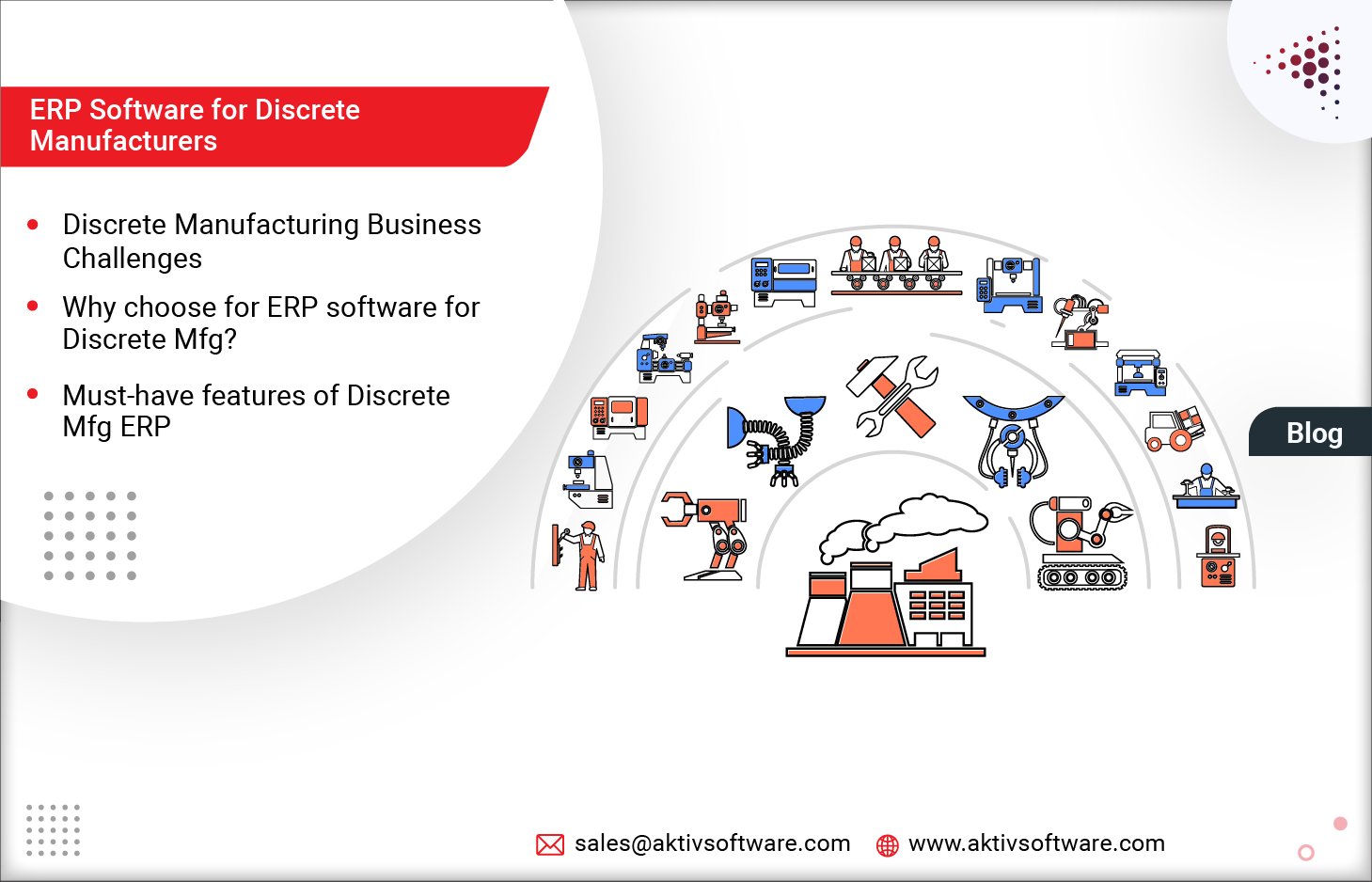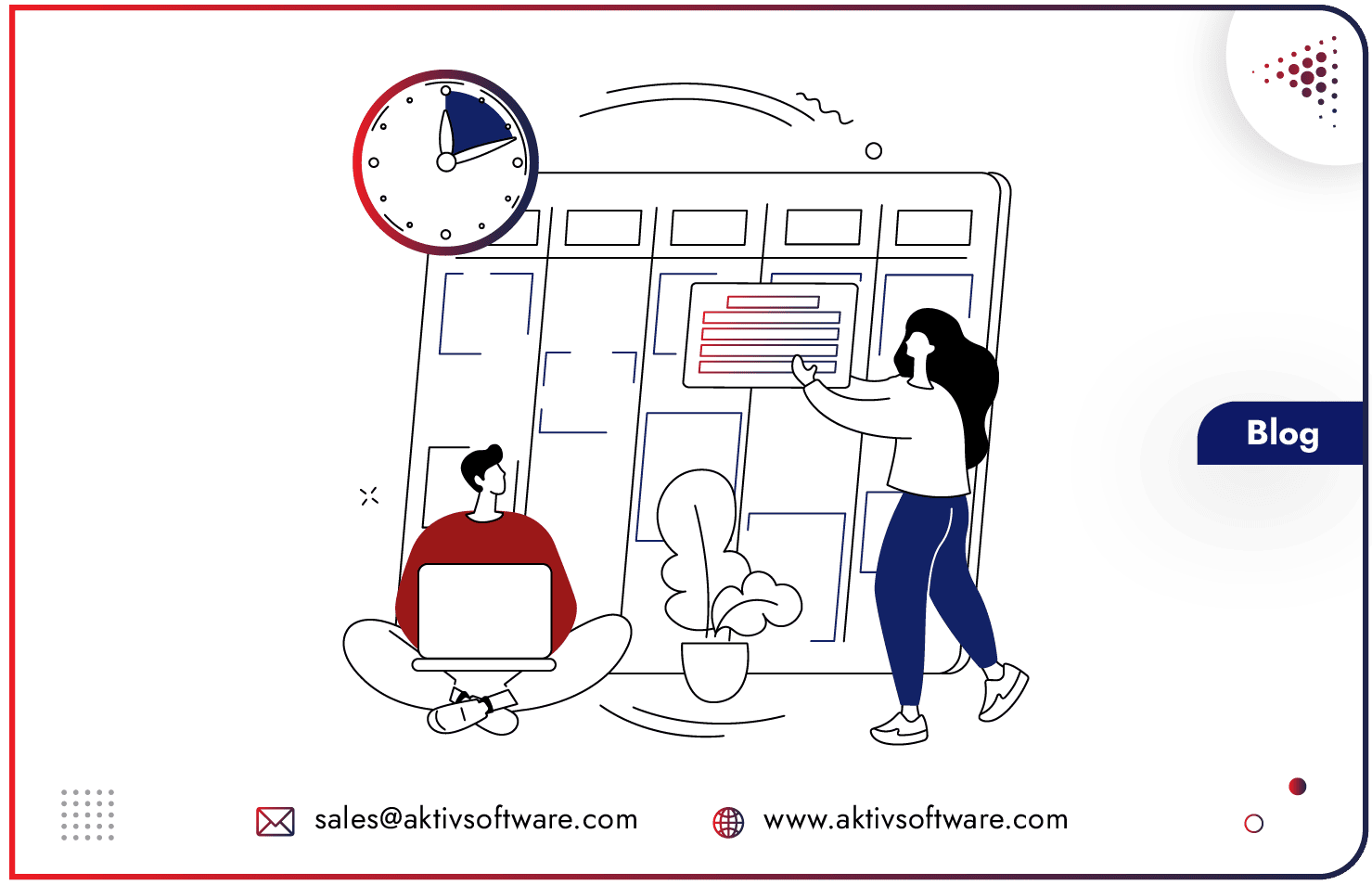Every step of discrete manufacturing, where finished distinct products are created and assembled– has challenges associated with control and visibility.
Are you a mixed-mode or to-order manufacturer who needs to increase shop floor efficiency and visibility while responding to supply chain disruptions?
If you are someone who can be characterized by unit production with high complexity and low volumes like aircraft or computers, or low complexity and high volumes, like nuts or bolts, then this blog will guide you in choosing suitable Discrete Manufacturing ERP software.
Discrete Manufacturing Business Challenges
Be it for Make-to-stock (MTS), Make-to-order (MTO), or Assembly-to-order (ATO), manufacturing workflows can go exceptionally deep depending on the industry and customer base.
A US Manufacturers Industry Report from April 2021 stated:
- 88% of discrete manufacturers experience longer-than-usual lead times
- 46% of discrete manufacturers were unable to deliver orders on time
- 40% of discrete manufacturers had customers reduce/cancel orders because of dissatisfaction with the service.
It is a complicated business- and might get further complicated by the pressure of changing market conditions like:
Maintain Profit Margins:
Growing global completion and the rising cost of materials or labor are forcing discrete manufacturers to work on the “do more with less” model, wherein they will need to maintain profit margins while keeping up with the competitive market prices.
66% of discrete manufacturers say improving profit margins is a major priority.
The Legacy Barriers:
This is seen as most often a challenge for those avoiding Discrete Manufacturing ERP while still embracing established legacy systems or paper-based processes. Handling business on such legacy systems becomes time-consuming and labor-intensive.
For example, suppose a factory floor worker has to read instructions or wants access to supplemental product information. In that case, they will need to make several rounds on the floor or contact their managers for the information, only causing delays and inaccuracies.
Supply Chain Gap:
Contrast, customer demands speed, flexibility, and quality alongside the market’s volatility. How to achieve this operational agility is a common question among discrete manufacturers.
Since they are at a distance from end customers, they often have no visibility into the factors that influence customer demand. This lack of visibility affects raw material shortages popping up unexpectedly.
Moreover, global uncertainty post-pandemic has made supply chain planning even more difficult.
A recent United States government report states that discrete manufacturers or OEMs have only enough inventory for five days of supply, clearly demonstrating the problem’s scope.
How will ERP Software help Discrete Manufacturers?
Discrete manufacturers frequently have to deal with engineering changes, creating ripples in the entire business’s operations.
A critical part of a discrete manufacturer’s processes is supply chain management, continual supervision of materials, information, and finances as they move from supplier>manufacturer>wholesaler>retailer>consumer.
To accomplish this successfully, transparency in suppliers’ systems, planning and documenting every step of manufacturing, estimating and tracking process plan, and managing the workload of workers and machine is essential for discrete manufacturers.
Without an integrated ERP system in place, sustaining all these administrative and operational processes could be challenging.
Discrete manufacturing ERP software can increase efficiency by integrating order status, supplier inventory, current pricing, order entry, and payment.
ERP utilizes data on each product to generate planning reports, so the progress of the process plans can be tracked.
ERP software also acts as a deciding factor during the make/buy process by applying job estimating to subassemblies to assess whether components should be made or bought.
Discrete ERP software also allows the workload of workers and machines to be adjusted; customized to suit the abilities of different workers while reducing the usage of the expensive machines and equipment to operate.
Feature Checklist for Discrete Manufacturing ERP
Implementing ERP has more than just selecting ERP after researching from Google, talking to industry experts, or emailing different ERP service providers.
Even after touching all the bases, you might still feel like you are no closer to an ideal Discrete ERP software for your business.
Here’s a definite ERP checklist that could come in handy while you are struggling to find a suitable Discrete Manufacturing ERP software.
Production Scheduling
For discrete manufacturers tracking operations of the shop floor are of utmost importance amidst the complexity and potential variability increase due to a changing product mix and shifting customer order patterns.
You can transform any high-mix or custom discrete manufacturing environment into a predictable, reliable, flexible, demand-driven operation with appropriate production scheduling features.
Your perfectly planned processes could get interrupted by stock-outs, staffing shortages, or unplanned downtime. At times, it may even include external challenges outside the scope of a manufacturer, such as sudden requests for faster delivery or larger quantities.
A discrete ERP bears the ability to dynamically arrange and rearrange the production schedule considering the above aspects all while calculating the cycle times against scheduled delivery dates.
Supply Chain Visibility
The discrete process supply chain can be dense, spread out over multiple locations, and passed through many hands before it actually reaches a customer/wholesaler/retailer.
As a consequence, the multiplication of links and locations can often make the supply chain weakly integrated. Nevertheless, with a specialized Discrete Manufacturing ERP system, it’s possible to achieve complete transparency in your supply chain.
Some modern Discrete Manufacturing ERP software like Odoo also includes sophisticated BI tools and data analytics so that you can stay updated on quality assurance, OEE, and other KPIs necessary for real-time decision-making.
Get in touch with one of our Odoo ERP experts to know more about its capabilities.
Inventory Management
It is evident that the discrete manufacturers have an intelligent inventory system when shipping and receiving products inhabit the core of the business.
By gathering all your inventory and shipment data into a single source, an ERP system can make it easier to track product moves while cutting out the hassles of monitoring the warehouse and trimming out unnecessarily shipped goods and excess shipment costs.
You’ll know where your product is, where and when it needs to be and how demand for particular products might fluctuate over time so that you can plan your stock levels accordingly.
Quality Control
Managing quality control has many moving parts and one needs to make sure that it could be seamlessly comprised into a Discrete Manufacturing ERP system.
Depending on your industry, your business’s quality control functions may be as simple as documenting inspections in your ERP while for highly complex industries such as documenting failure modes and effects analysis or corrective and preventative actions. Either way, it couldn’t be foreseen.
Concluding Thoughts
Whether it is about quickly generating a quote, creating a sales order, custom-configuring products at the point of sale, or assigning special pricing arrangements, the ERP should provide responsive service to your customers.
Make sure that you fully understand what you seek out of Discrete ERP software; only after truly mapping out your business requirements and the role that ERP will play in it, you can begin the selection of a suitable discrete manufacturing ERP.
Most manufacturers prefer expert ERP consultation in such cases.
While selecting Discrete Manufacturing ERP software, you mustn’t just go for the cheapest or most convenient option. Look for one that supports many of your core requirements and can also be easily customized to align with all your processes.






